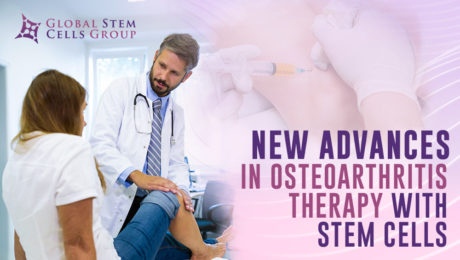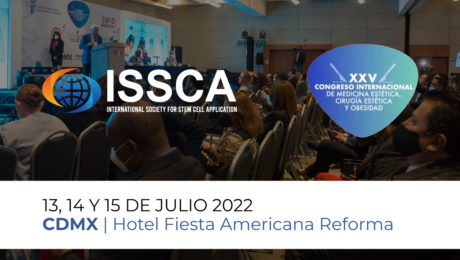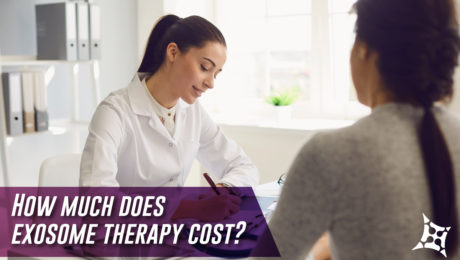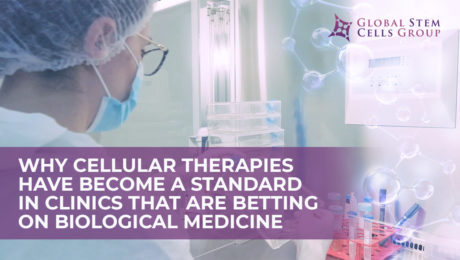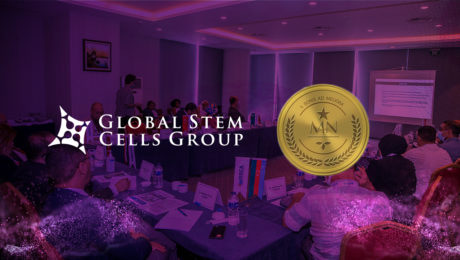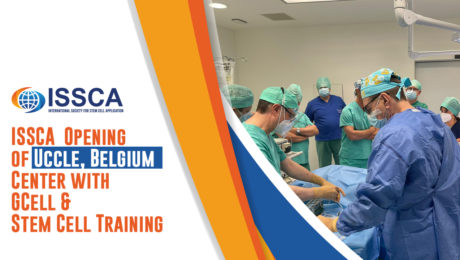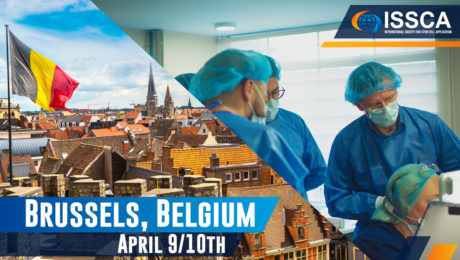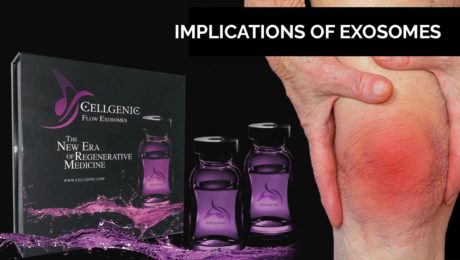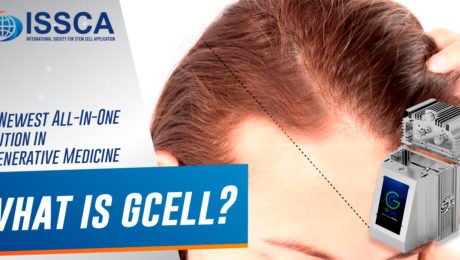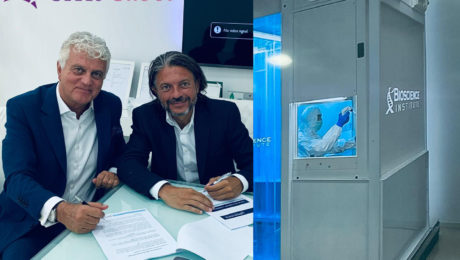New advances in osteoarthritis therapy with stem cells
Osteoarthritis is a rheumatic pathology that damages the articular cartilage. By joining two bones through the joint capsule, the joints are able to move, providing us with functional autonomy. An inner fluid called synovial fluid is usually found within joints, which is produced by the synovial membrane. Articular cartilage covers the ends of the bones that form the joint. As a result of damage to this articular cartilage, pain, stiffness, and functional impairment occur. Osteoarthritis is the most common joint disorder, usually beginning between the ages of 40 and 50, affecting to some degree almost everyone over the age of 80. Typically, osteoarthritis affects the spine, shoulders, fingers, hips, knees, and toe joints.
Stem cell therapies have the potential to treat a broad spectrum of diseases. Whether it’s rhizarthrosis, diabetes, neurodegenerative diseases, spinal cord injuries, or heart disease. By utilizing stem cells, regenerative medicine is capable of repairing tissues in affected areas. The main difference between lipo gem therapy and other treatments for osteoarthritis is that lipogem therapy regenerates cartilage, avoids surgery and its sequelae, and improves the quality of life for patients.
The potential for medical treatments with stem cells and their by-products is currently very high. In the field of sports medicine and traumatology, one of the most outstanding advances has been made for the first time in decades recently: Spanish scientists have achieved a degree of tendon regeneration in 100% of injured patients, resulting in a decrease in pain and a return to sport within two months, and just six months after the trial was completed.
A research performed by the Institute of Regenerative Tissue Therapy (ITRT), published by the prestigious American Journal of Sports Medicine. Demonstrates how this therapy regenerates chronic lesions in the patellar tendon and opens up a new therapeutic option for this tissue, which was considered impossible to regenerate.
In most patients, fat tissue can be harvested minimally invasively (under local or general anesthesia), providing a highly viable MSC population regardless of donor age. Similar to MSCs derived from other tissues, adipose tissue-derived MSCs have regenerative potential. As osteoarthritis is a very common joint disease, and knee osteoarthritis is the most common form, it is necessary to review scientific literature on osteoarthritis treatments with stem cells, like lipogems.
Lipogems Therapy
Lipogems therapy is a novel procedure that enhances the body’s natural ability to heal itself through the innovative power of science and biotechnology. The Lipogems method involves injecting mesenchymal stem cells into the joints. Adipose-derived mesenchymal stem cells have enormous regenerative potential. They also have a regenerative capacity independent of their age. Even older individuals can benefit from this procedure.
Injection of mesenchymal stem cells into the knee, particularly in the early stages of osteoarthritis, can stop the process of inflammation and degeneration, especially in the less advanced stages of the disease. In addition to preventing progressive physical deterioration of the articular cartilage, this treatment contributes significantly to a patient’s well-being and prevents the installation of knee prostheses.
Patellar tendinopathy, physiotherapeutic treatment and stem cell therapy
Injuries to the patellar tendon that connects the kneecap to the tibia are known as patellar tendinopathy or patellar tendinitis. The patellar tendon works with the muscles in the front of the thigh to extend the knee so you can kick, run and jump. Athletes who perform frequent jumping in their sports, such as basketball and volleyball, are most likely to suffer from patellar tendonitis. However, people who don’t engage in jumping sports may develop patellar tendonitis. Patients with patellar tendinitis usually begin treatment with physical therapy to stretch and strengthen their knee muscles.
Strength training with eccentric resistance is one of the most common treatments for tendinopathies. Alternatively, it has been demonstrated that bone marrow-derived mesenchymal stem cells (MSCs) can regenerate injured patellar tendons. Within six months of treatment, it has been observed that the structure of this tissue – which is always difficult to treat – is restored, reaching a regeneration of 40% in all injured persons, with a gradual improvement that eventually becomes complete.
It has been found that traditional management methods, including isometric or eccentric exercises, shock wave therapy, and even surgery, are not effective. As part of a rehabilitation program in chronic patellar tendinopathy, autologous expanded bone marrow mesenchymal stem cells (BM-MSC) or leukocyte-poor platelet-rich plasma (Lp-PRP) may be effective in reducing pain and improving activity levels. Traditional management, which includes isometric or eccentric exercises, shock wave therapy, and even surgery, has limited success. A combination of autologous expanded bone marrow mesenchymal stem cells (BM-MSCs) and leukocyte-poor platelet-rich plasma (Lp-PRP) and rehabilitation may reduce pain and improve activity levels in active participants with chronic patellar tendinopathy.
To learn more about stem cells, cellular therapies and keep up to date with all the information about regenerative medicine and its advances, sign up for our international certification in regenerative medicine at www.issca.us
- Published in Corporate News / Blog
ISSCA Members to Present in the XXV Congreso Internacional de Medicina, Cirugia Estética y Obesidad
The XXV Congreso Internacional de Medicina, Cirugia Estética y Obesidad will take place in CDMX, México on July 13,14 and 15, 2022. The International Society for Stem Cell Application (ISSCA) will be actively taking part in the congress. The ISSCA is a multidisciplinary community of physicians and scientists with a mission to advance the science, technology, and practice of regenerative medicine to treat diseases and lessen human suffering through science, technology, and regenerative medicine. Several ISSCA members will be presenting or giving demonstrations on the latest protocols and technologies in regenerative medicine.
- Benito Novas, the managing director of the ISSCA from the USA, will give a talk about Digital Marketing in Cash-Based Practices. Benito Novas is a global entrepreneur, manager, and keynote speaker, who specializes in marketing focused on biotechnology, life sciences, and healthcare development. He has served as the director of the ISSCA since 2016. His published books in Aesthetic Practice and Digital Marketing can be found here. In his presentation this July, he will share his visionary approach to healthcare management and regenerative medicine. Congress attendees will have the opportunity to learn why doctors must use digital marketing strategies to grow a successful practice. Benito Novas will provide tips to attendees on how to capitalize on social media trends to grow practice influence.
- Dr. Maritza Novas, the ISSCA director of education from the USA, will talk about Allogeneic Therapies and Stromal Cell Exosomes. The use of allogeneic therapy is one of the most attractive alternatives to autologous products and is of utmost interest to researchers in recent years. Exosomes serve as mediators for cell-to-cell communication and can be used as cell-free therapeutics for their special characteristics. Dr. Maritza Novas has been in aesthetic and anti-aging medicine since 2001. She is globally recognized for her work in regenerative medicine and dedicated service in education.
- Dr. Silvina Pastrana, the Argentina chapter director of the ISSCA from Argentina, will present on Fundamentals of Cellular Therapies and Mesenchymal Stem Cells (MSC). Dr. Pastrana heads a staff of medical specialists in orthopedics, rheumatology, medical clinic, and cosmetic surgery, performing procedures that incorporate stem cell therapies. She has been serving as a staff surgeon for the Hospital Dr. Prof. Luis Güemes for 21 years.
Besides the above presentations, look forward to sessions in the practical portion of the congress, where the following ISSCA members will show the latest protocols and technologies in regenerative medicine:
- Dr. Julio Ferreira (Argentina), Cosmetic Surgery / Aesthetic Medicine
- Dr. Andrea Lapeire (Argentina), Aesthetic Medicine
- Dr. Maritza Novas (USA), ISSCA Director of Education in the USA
- Dr. Silvina Pastrana (Argentina), Chapter Director of ISSCA in Argentina
The ISSCA members are the leaders in setting standards and promoting excellence in the field of regenerative medicine, related education, certification, research, and publications. The Global Stem Cells Groups (GSCG) is a group of companies, including the ISSCA and other members, dedicated to facilitating stem cell research and medicine. Making the benefits of stem cell medicine a reality for both doctors and patients worldwide is the goal of the GSCG. To learn more, visit our sites at the ISSCA and the GSCG.
- Published in Press Releases
How much does exosome therapy cost?
Exosome therapy is the new buzz in the regenerative medicine industry because of how it can repair and regenerate your cells and tissues.
Exosome therapy is safer compared to other cellular therapy because it’s a cell-free therapy with no risk of rejection.
Exosome therapy will be beneficial to you if you’re dealing with conditions such as sports injuries, tissue regeneration, hair loss, erectile dysfunction, chronic pain, and many other applications.
In this article, you’ll learn about the cost of exosome therapy and how you can benefit from it.
How the Cost of Exosome Therapy is Determined
All cells produce exosomes, which are microvesicles that contain biochemical and genetic information.
The cost of an exosome product (used in exosome therapy) will depend on the type of cell line (raw tissue source) used to extract the exosomes.
The first factor to determine the cost of an exosome product is the quality of the tissue source.
The most commonly used tissue types are cord blood, amniotic fluid, and mesenchymal cell cultures.
Exosomes derived from mesenchymal cell cultures are the most difficult to obtain but offer the greatest therapeutic potential.
How Much Does Exosome Therapy Cost?
The average cost of exosome therapy is $4,900, but the price can range from $3,500 to $6,500.
It’s also important to note that the price depends on your specific needs and your treatment plan, as decided by the doctor.
The doctor will schedule a consultation with you to determine your personalized treatment plan.
The exosome therapy can either be given as an IV infusion or as localized injections, depending on the purpose of the therapy.
Exosomes are very useful to revitalize, rejuvenate, restore, and reduce inflammations in the body.
Benefits of Exosome Therapy
Hair Loss Therapy
If you’re in the early stages of hair loss, exosome therapy can help regenerate your hair whether you’re a man or woman. After exosome therapy, you’ll start seeing new hair growth in as little as two to three months, with significant results showing six months to one year later.
Chronic Pain
If you’re experiencing chronic pain due to degenerative conditions such as arthritis, exosomes can help subdue the pain by regenerating the cells and helping the body work better.
Degenerative Conditions
For degenerative medical conditions such as osteoarthritis and musculoskeletal injuries, exosome therapy can help your body repair the damage done to your cells, prevent further deterioration, and help you feel better.
Skin Therapy
Exosome therapy can reduce inflammation in the skin by improving its strength and elasticity.
Anti-Aging
If you would like to retain your youthful glow, exosome therapy can make you feel young again by rejuvenating your skin and reversing the aging process in your cells.
Where Can You Get Exosome Therapy?
Cellular Hope Institutes provide exosome therapy for patients looking for better outcomes for various conditions.
The exosomes used at Cellular Hope Institute are obtained from umbilical cord tissue discarded after birth, which means these exosomes have not been exposed to any contaminants or toxic agents, ensuring a higher capacity to regenerate your cells and tissues.
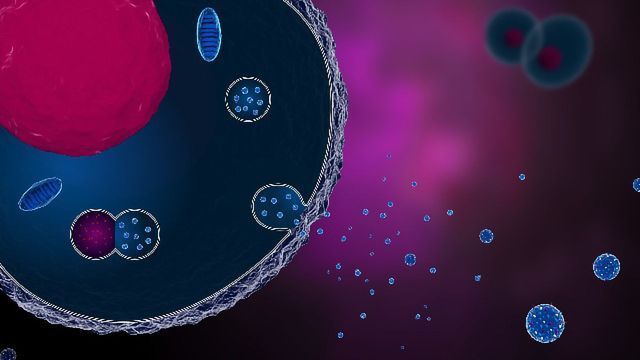
- Published in Corporate News / Blog
Why cellular therapies have become a standard in clinics that are betting on biological medicine
Cellular therapy is fast becoming a standard therapy in many regenerative clinics today. Many doctors are no longer questioning the safety and effectiveness of stem cell therapy. This is because various stem cell studies are already describing the benefits of stem cells for patients who are living with chronic and autoimmune health conditions.
This article will discuss why stem cell therapy has become a standard therapy in clinics, the paracrine effect of stem cells, and other reasons why doctors are adopting stem cells in their clinics.
Benefits of Stem Cell Therapy
Stem cell therapy is an important innovation in medicine because of its regenerative power in the human body. Most disease states are characterized by damaged cells, tissues, and organs, which is where stem cell therapy comes in. In stem cell therapy, stem cells are administered into the human body and replace the cells damaged by disease or health disorders.
Stem cell research has revealed two major ways of using stem cells to rebuild defective and damaged cells. One of these ways can be seen in procedures like bone marrow transplant, where stem cells are used to replace the damaged cells by engrafting, and they then differentiate into the proper cell type. Another mechanism relies on the paracrine effect of stem cells. This procedure of stem cell therapy involves using stem cells isolated from a donor to stimulate the patient’s cells to repair damaged tissues.
Additionally, unlike traditional therapy, stem cells have a wide application. Stem cell therapy is used to manage various degenerative diseases, autoimmune disorders, birth defects, and the research is still ongoing for so many other health conditions where stem cells have shown potential.
Also, there is currently a high demand for aesthetic medicine. Stem cell therapy is a proven alternative to other forms of cosmetology such as plastic surgery. Hence, dermatologists are turning to stem cell therapy to administer anti-aging procedures, skin rejuvenation, hair therapy, micro-needling, etc.
Why Cellular Therapies Have Become a Standard
The paracrine effect of stem cells is one of the most outstanding effects of stem cells. It involves using donor cells to stimulate endogenous repair by harnessing the regenerative power of the human body. It is a mechanism of tissue regeneration that has created new possibilities for managing various conditions using stem cell therapy.
The cells that trigger a paracrine response are mesenchymal cells, umbilical cord blood, umbilical cord tissue, adipose (fat) tissue, and blood cells from a donor’s bone marrow.
The Paracrine Effect of Stem Cells
The paracrine effect occurs when the donor’s cells send the damaged or defective cells signals to induce self-regeneration and repair by secreting some factors and proteins. One of the mechanisms by which this paracrine effect is initiated involves the secretion of cytokines and regulatory proteins by the damaged patient’s cells. These cytokines and proteins act as mediators to stimulate an immune response that attracts the donor cells, causing the donor cells to release proteins and factors that stimulate the patient’s cells to promote cell proliferation, increase vascularization, and blood flow to the areas that need to heal, while reducing inflammation.
Moreover, research has shown that the paracrine effect of stem cells prevents damaged and diseased cells from dying. They are also therapeutically useful in autoimmune diseases and preventing transplant rejection due to the immune suppression effect they have.
Is Stem Cell Therapy Effective?
Doctors are always looking for ways to provide the best possible treatment to their patients, and that is why many clinics are embracing stem cell therapy as a standard, due to its many advantages.
Stem cell therapy is one of the most effective and safest therapies patients can receive compared to other existing treatment options. Stem cell therapy is used in promoting patient outcomes in a lot of disease conditions that were previously poorly treated by other alternatives.
As new potentials and ways of applying stem cells are being discovered, doctors are beginning to maximize these benefits in their clinics. Some conditions that are currently treated by stem cells include autoimmune conditions, immunotherapy CAR-T cells, chronic obstructive pulmonary disease, neurodegenerative conditions, osteoarthritis, spinal cord injury, aesthetics/anti-aging, sports medicine, autism, and multiple sclerosis.
Therapeutic Uses of Stem Cells vs Traditional Medicine
Existing stem cell research has shown how the regenerative effect of stem cells is defining the future of medicine. The major advantage of stem cell therapy over conventional medication-based therapy is its safety. Stem cell therapy is aimed at treating the cause of the disease while traditional medicine targets the symptoms.
Another problem with traditional medical therapy is that it introduces another problem while trying to solve the existing one. As a doctor, you always run the risk of causing harm with each prescription because of various adverse effects that could lead to major organ damage of the kidney, liver, etc. On the other hand, patients already know this and they are actively seeking better alternatives, which is why stem cell therapy is fast becoming a standard therapy in clinics.
Moreover, doctors will always be concerned about whether their patients are taking their medications or not. The burden of drug compliance and adherence associated with traditional medical therapy is not always easy to navigate. This is why effective treatment options like stem cell therapy have become a standard therapy in clinics. It only requires the patient having a procedure that repairs and restores damaged cells and tissues in the most natural way.
If you would like to become certified in regenerative medicine using stem cells and other cellular therapy, contact us.
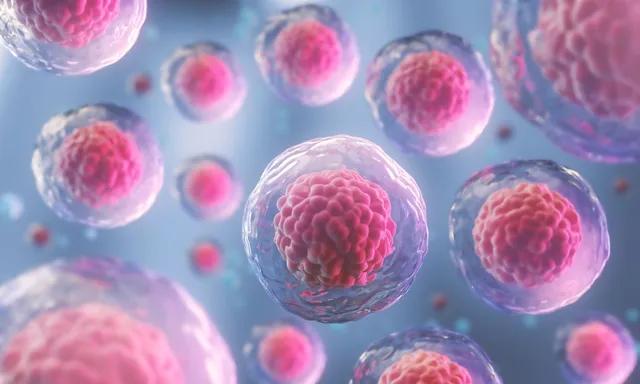
- Published in Corporate News / Blog
Meso Numismatics Closes Global Stem Cell Group Acquisition
LAS VEGAS, NV, August 18, 2021 (GLOBE NEWSWIRE) — via NEWMEDIAWIRE — Meso Numismatics, Inc. (“Meso Numismatics” or the “Company”) (MSSV), a technology and numismatic company specializing in the Meso Region, including Central America and the Caribbean, MSSV is pleased to announce that it has closed its acquisition of Global Stem Cells Group. “We are pleased to have finally been able to close on this acquisition,” said David Christensen, President and CEO of MSSV,” We are now well positioned to enter into the growing global Regenerative Medicine industry.”
Global Stem Cells Group (Global) is a premier Regenerative Medicine company that specializes in cutting edge stem cell research, current clinical applications, and physician training. Global licenses its intellectual property and name to medical professionals around the world providing them with necessary equipment and cellular therapy products needed to perform safe and effective Regenerative medicine related treatments. Global has one of the larges physician membership networks in the world with 29 offices in more than 25 countries. The worldwide Regenerative Medicine industry is a multi billion-dollar industry projected to have double digit annual growth rates over the next decade. For more information on Global Stem Cells Group please follow the link www.stemcellsgroup.com
Please read this press release in conjunction with the 8K that was filed today on www.sec.gov.
MSSV has also renegotiated its June 22, 2021 $10.5M financing, of which $8.2M is earmarked for the Lans Holdings Escrow as per the 8k filed June 24th, 2021, as follows: the warrant maturity has been changed to 7 years instead of 3 years and the warrant shall be locked up for the first 2 years whereas during the lock up period the warrant will not be able to be exercised.
This press release should be read in conjunction with all other filings on www.sec.gov
For more information on Global Stem Cells Group please visit: www.stemcellsgroup.com
About Meso Numismatics: Meso Numismatics, Corp is an emerging numismatic and technology company specialized in the Meso Region, including Central America and the Caribbean. The Company has quickly become the central hub for rare, exquisite, and valuable inventory for not only the Meso region, but for exceptional items from around the world. With the Company’s breadth of business experience and technology team, the Company will continue to help companies grow. Meso has now added bio-technology to it’s portfolio and will continue to grow the company in this new direction.
This press release should be read in conjunction with all other filings on www.sec.gov
For more information on Global Stem Cells Group please visit: www.stemcellsgroup.com
About Meso Numismatics: Meso Numismatics, Corp is an emerging numismatic and technology company specialized in the Meso Region, including Central America and the Caribbean. The Company has quickly become the central hub for rare, exquisite, and valuable inventory for not only the Meso region, but for exceptional items from around the world. With the Company’s breadth of business experience and technology team, the Company will continue to help companies grow.
Forward Looking Statements
Some information in this document constitutes forward-looking statements or statements which may be deemed or construed to be forward-looking statements, such as the closing of the share exchange agreement. The words “plan”, “forecast”, “anticipates”, “estimate”, “project”, “intend”, “expect”, “should”, “believe”, and similar expressions are intended to identify forward-looking statements. These forward-looking statements involve, and are subject to known and unknown risks, uncertainties and other factors which could cause the Company’s actual results, performance (financial or operating) or achievements to differ from the future results, performance (financial or operating) or achievements expressed or implied by such forward-looking statements. The risks, uncertainties and other factors are more fully discussed in the Company’s filings with the U.S. Securities and Exchange Commission. All forward-looking statements attributable to Meso Numismatics, Inc., herein are expressly qualified in their entirety by the above-mentioned cautionary statement. Meso Numismatics, Inc. disclaims any obligation to update forward-looking statements contained in this estimate, except as may be required by law.
For further information, please contact:
Investor.relations@mssvinc.com
Telephone: (800) 956-3935
- Published in Press Releases
ISSCA Opening of Uccle, Belgium Center with GCell & Stem Cell Training
After several months of organizing and developing a location, the Global Stem Cells Group has finalized the construction of a laboratory and regenerative medicine research center in Uccle, Belgium.
This facility serves both as a regenerative medicine treatment and research center, but also as a plastic surgery clinic. In addition to this, one of the primary goals of the Center is to serve as a place for the fostering of knowledge and experience regarding the different products and equipment required for the application of cellular therapies. As part of the inaugural ceremony a group of physicians were trained in the setup and use of the various regenerative medicine protocols and application process of these cells into the patients.
This center is a push into Europe for the Global Stem Cells Group. As the science advances, newer and more advanced therapies and technologies are being developed and released into the market with each passing month.
With the European Union being one of the largest consumer markets in the world, the finalization of a brick-and-mortar location in Brussels, Belgium is one that will mean great things for the Global Stem Cells Group, and the presence and proliferation of regenerative medicine throughout Europe and the world.
“This was a wonderful opportunity that we could have. It goes to show that even during this pandemic, the medical community is one that is still going strong. We’re still rallying together to look for new breakthroughs, and come up with the most beneficial treatment options for patients,” Said Benito Novas, founder of the International Society for Stem Cell Applications, “In addition to this, it also provides an excellent platform for the distribution of regenerative medicine therapies and equipment, including the revolutionary new GCell Machine,”
Indeed, the inaugural training at the Stem Cell Center in Uccle, Belgium was one that covered both of the more traditional methods of stem cell isolation and application– adipose and bone-marrow derived autologous cells, but this training was also one of the first in which the company had the ability to demonstrate the novel GCell Machine. Using a precise system of blades and filters, it is able to process a stem cell sample from adipose tissue in less than half of the time that it would take a physician to do so through traditional means.
This allows the patient to be more comfortable throughout the shorter procedure, as less anesthesia is also required than when operating under traditional means. The GCell is a minimally invasive, portable machine that allows physicians to fully unlock the potential of regenerative medicine as a component in their practice. Using their global network of distributors and licensed vendors, Global Stem Cells Group is working fervently to ensure no interruption in the global availability of the most cutting-edge regenerative medicine products.
- Published in Press Releases
Global Stem Cells Group Announces Training in Brussels, Belgium for April 9/10th
The Global Stem Cells Group, a multi-disciplinary community of scientists and physicians that are collaborating to treat diseases and lessen human suffering through the advancement of the field of regenerative medicine has announced plans for a training in Brussels, Belgium on April 9/10th. This course is a long-awaited return to the country of Belgium after months of inactivity in the region brought about by the COVID-19 pandemic. During this time, research proceeded, and shocking discoveries were made that further thrust regenerative medicine into the world’s stage, and as a result the curriculum has been reinforced with the latest in IV therapy and exosome protocols.
This training will be one of the first of 2021, reaffirming the Global Stem Cells Group’s presence in Europe as a key player in the field of regenerative medicine. Members from both Global Stem Cells Group & the International Society for Stem Cell Application’s Brussels Chapter will be there to assist in expanding research for and the practice of regenerative medicine across Europe.
“It’s good to know that the Global pandemic has not been able to stop the progress of business,” Says Benito Novas, founder and CEO of the Global Stem Cells Group, “With reopening happening slowly, but surely, we hope that more and more physicians and clinics will take up the benefits of regenerative medicine.As we continue to train patients with the GCell Machine, ”
This training is intended to teach physicians the value and process behind incorporating regenerative medicine into their own clinical practice. This includes a theoretical portion that goes over basic regenerative medicine biology and its application, but also includes a Hands-On portion in which doctors, in a controlled environment and guided by a team of medical professionals, will have the opportunity to see procedures be performed just a few feet away, and then get the opportunity to try it for themselves.
The Belgium Stem Cell Center is one that is outfitted with the latest technology in regenerative medicine processing, which ensures any students that pass through it receive an education in extraction, isolation, and application of Platelet-Rich Plasma, Adipose, and Bone Marrow-Derived Mesenchymal Stem Cells.
This training will also teach physicians how to utilize the GCell Machine to perform regenerative medicine therapies. GCell is a tissue homogenization device that is revolutionizing the future of regenerative medicine. It is an extremely compact, all-in-one unit that can homogenize and isolate the stem cells from an adipose sample. GCell’s process of homogenizing with a system of precise blades and filtering ensures that the sample can be processed within an hour, with little input from the physician when the machine begins to do its work.
Once the process is over, the end result is a final product that can be administered to patients within an hour after the initial tissue extraction. This is a far cry from the previous, muti-hour long treatments that physicians have grown accustomed to, and the shortened timespan and simplicity of the procedure is something that both doctors and their patients will greatly appreciate.
If you are interested in enrolling in this upcoming event, or to learn more about the different training opportunities available, you can visit us at our training website.
About Global Stem Cells Group
Global Stem Cells Group (GSCG) is a worldwide network that combines seven major medical corporations, each focused on furthering scientific and technological advancements to lead cutting-edge stem cell development, treatments, and training. The united efforts of GSCG’s affiliate companies provide medical practitioners with a one-stop
hub for stem cell solutions that adhere to the highest medical standards.
- Published in Press Releases
Implications of Exosomes
As the newest field in regenerative medicine, exosome therapy is often the least understood by doctors new to the field. While still not widely used by many doctors, this is simply because it is new. However, many scientists are eager to harness the benefits of this new treatment and apply them to target various conditions that modern medicine has struggled to address.
Extracellular Vesicles and Exosomes
The discovery of extracellular vesicles (EV), small bubbles composed of protein freely among cells, has been considered one of the greatest advancements in the field of medicine. They are broadly defined as entities that exist outside of the cells of the human body and can be quite unique. Among these are exosomes, which have shown almost miraculous promise in treating inflammation, immunomodulation, cell-cell communication, and much more. Although not a cure-all, exosomes are effective in their roles, which include the communication and rejuvenation of all cells in the body, despite not actually being cells themselves.
Exosomes are created by growing a healthy stem cell culture and then disposing of the cells, leaving behind millions of exosomes created in the process. Due to their microscopic size, what is left behind must be ultra-centrifuged to concentrate them enough for patient use. Despite all their abilities, the makeup of exosomes is quite simple, consisting of amino acids and RNA. This means that, aside from their immunomodulatory properties, exosomes can be applied to a patient without causing an immune system reaction, a common concern with other treatments.
An Overview of Exosome Therapy
Generally defined, exosome therapy is the use of exosomes in a clinical setting, a new step forward that is being happily taken by physicians worldwide. Exosome therapy has rapidly become one of the most popular fields of regenerative medicine treatment globally. Painstaking research has highlighted the practical uses of exosomes, and how they can treat conditions including Lyme disease, hair loss, and arthritis. While stem cells are responsible for the rejuvenation of older cells, they might not be able to supply the information required for healing to take place—this is where exosomes come in.
Consider exosomes the traffic conductors of regenerative medicine. They stimulate attention to damaged areas and work to control inflammation. Many researchers believe that supporting the function of exosomes in the body could lead to better outcomes for patients. These scientific breakthroughs have fundamentally changed the healing process as we know it.
How Exosome Therapy Works
Exosome therapy is minimally invasive and most commonly used in patients with orthopedic injuries, but it also has great applications in anti-aging medicine and the treatment of inflammatory and degenerative diseases. Exosome treatments generally contain a combination of growth factors, messenger RNA, micro RNA, and cytokines. The resulting exosome treatment is used in conjunction with stem cell therapies to boost the healing process in patients. These exosome therapies can be administered directly into the affected area or through an IV drip for those seeking the anti-aging properties of exosomes.
Exosome injections are administered similarly to other cellular therapies—directly into the part of the body affected by disease. Patient dosing varies based on the condition and treatment plan, allowing physicians to customize them to a patient’s needs.
What Can Exosomes Treat?
As the field of regenerative medicine constantly grows, more treatments are discovered every month. Researchers have found exosomes to be an exciting alternative for a wide variety of illnesses, including arthritis therapy, where they play a significant role in bone and cartilage remodeling. Exosome therapy currently shows promise in treating the following conditions:
Hair Loss
Exosomes can regrow hair due to their growth factor content. When injected, exosomes trigger healing and the natural regeneration of hair follicles.
Lyme Disease
Exosomes may benefit patients suffering from Lyme disease, a complex disease that compromises the immune system. By incorporating exosomes into a treatment plan, patients could break the cycle of inflammatory response.
Arthritis
Arthritis, characterized by joint inflammation due to autoimmune deficiency, can be alleviated with exosome therapy. Although various treatments are available, exosomes show potential in reversing the disease’s progression.
Anti-Aging
Aging can be thought of as a slow, steady inflammation of the body. Researchers have found a direct correlation between the number and types of exosomes within the body and the effects of aging. Exosome therapy could reduce swelling and treat conditions like crow’s feet, puffy eyes, and other markers of aging.
Pain Management
Many pain symptoms result from inflammation. For severe, chronic conditions that cannot be treated with over-the-counter options, exosome therapy could be key. By targeting the pained area at the source of inflammation, exosome therapy can increase the quality of movement and reduce pain in certain orthopedic conditions, including stress injuries.
As physicians around the world continue to study and apply exosomes, Global Stem Cells Group recognizes the need to get these products into doctors’ hands. Our Cellgenic line has been in operation for years, helping physicians treat these conditions and more with exosome therapy.
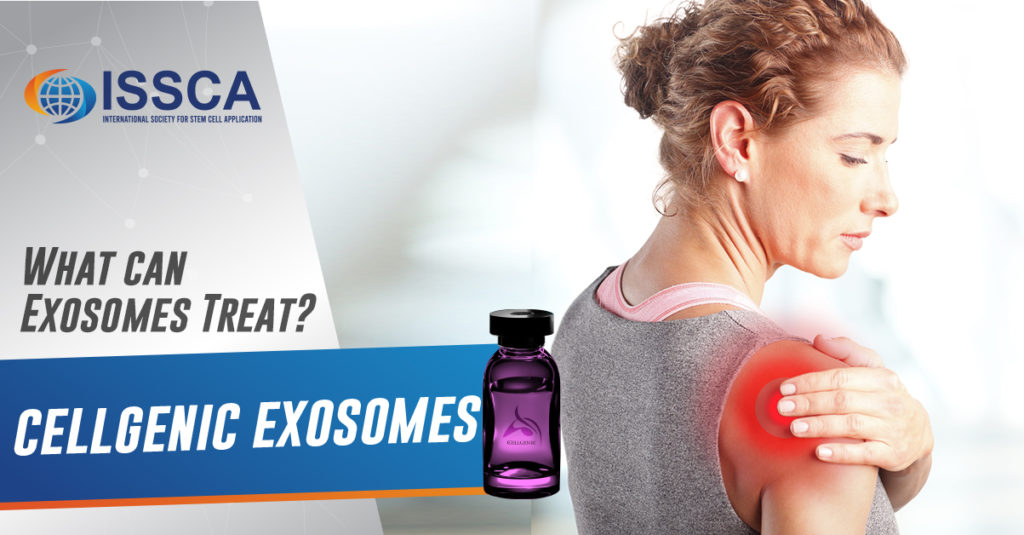
- Published in Corporate News / Blog
GCell: The Newest All-In-One Solution in Regenerative Medicine
Are you a physician currently utilizing adipose tissue but growing tired of the time-consuming, arduous procedure? Are you having problems finding reagents that allow you to isolate stem cells? If so, GCell might be the solution for you.
What is GCell?
GCell is a revolutionary new machine poised to become the future of adipose stem cell processing. Its compactness and short processing time make it a valuable implement in any regenerative medicine practitioner’s office. GCell employs a process of mechanical breakdown, which shortens the treatment duration and keeps it within legal minimal-manipulation regulations.
How Does GCell Work?
Through a system of extremely small blades and filters, GCell homogenizes a sample of fat taken from anywhere in the body, turning it into a slurry of growth factors, proteins, and other components. GCell then filters out the stromal vascular fraction cells and uses a process called photoactivation to increase their vitality. The end result is a final product that can be administered to patients within forty minutes from the sample’s harvesting. This is a significant improvement over the previous, multi-hour long treatments that physicians have grown accustomed to, and this shortened timespan is greatly appreciated by both doctors and patients.
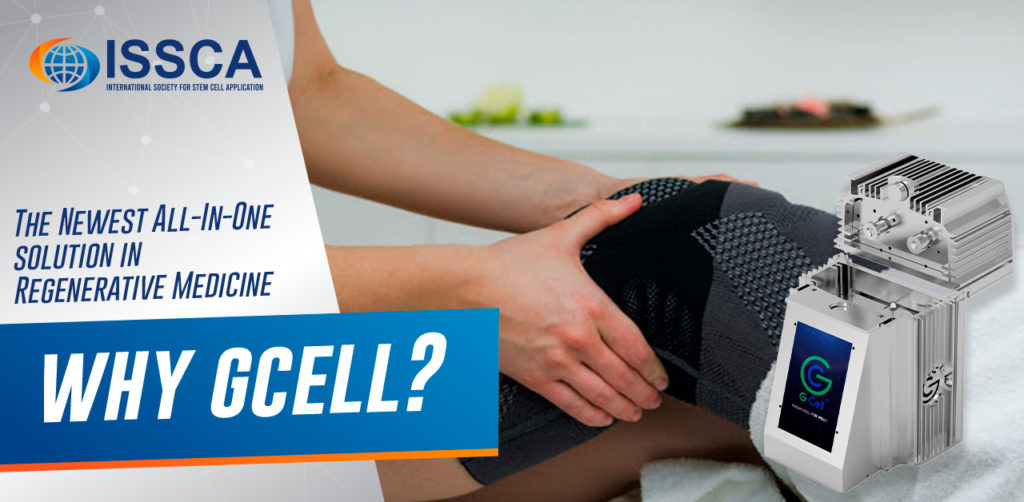
Why GCell?
GCell offers a single-session treatment, meaning patients only need to visit their clinic once without requiring follow-up treatments. This machine combines the convenience of its small size and lightweight build with the ability to accelerate the stem cell harvesting process. Additionally, GCell is designed to be an entirely enclosed system, ensuring samples remain in a sterile environment, which preserves the viability of samples and ensures positive outcomes for patients.
GCell: The Newest All-In-One Solution in Regenerative Medicine
GCell combines a grinder, a filter, and a photoactivation device, offering a turnkey solution that can take a physician from harvesting a fat sample to administering an injectable regenerative medicine therapy in less than an hour. GCell is especially useful for clinics just beginning to implement regenerative medicine into their practice, with its all-inclusive approach to stem cell isolation setting it a cut above the rest.
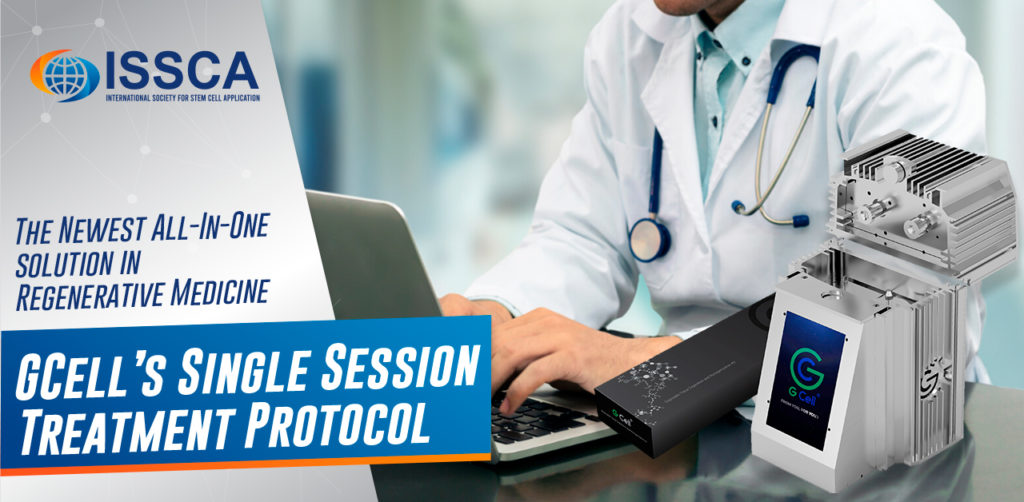
GCell’s Single Session Treatment Protocol
Unlike many other cellular therapies on the market, GCell provides a single-session treatment, eliminating the need for patients to return after their original treatment day. Its portability, small stature, and ability to accelerate the stem cell harvesting process make it ideal for clinics new to regenerative medicine, taking much of the rigor out of adipose-derived stem cell harvesting.
- Published in Corporate News / Blog
Global Stem Cells Group Announces Partnership with Bioscience Cell Factory
Just earlier this week, Global Stem Cells Group has signed a historic agreement with a company known as Bioscience Cell Factory– this Dubai-based healthcare company will allow GSCG to act as their representatives operating in both the Middle East and Latin America. Through the acquisition of proprietary branding rights Global Stem Cells Groups will become committed to promote the widespread use of cellular therapy treatments that utilize Mesenchymal Stem Cells (MSCs).
This partnership is groundbreaking in nature, and promises to lead to a wide proliferation of cellular therapies in both the Middle East and Latin America, two regions that are rapidly developing, with a constantly-advancing standard of medical care. Global Stem Cells Group will be clinically equipped with the highest standards and quality procedures as set forth by the Bioscience Cell Factory, resulting in nothing but the best treatment methods available for patients around the world.
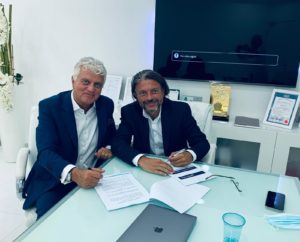
“I’m extremely excited about this partnership,” Said Benito Novas, CEO of the Global Stem Cells Group, “Bioscience Cell Factory is one of the most professional and scientifically-focused teams that I’ve ever had the pleasure of working with– I am looking forward to the start of what will be an extremely beneficial professional relationship that will provide our global reach with the quality of Bioscience’s laboratory,”
Indeed, the two firms are also announcing plans to do research together into the nature of adult Mesenchymal Stem Cells, and the benefits that they hold for the medical field. Through the training of physicians and the handling of cell samples in their laboratory, there are high hopes for the advancement of the field of regenerative medicine research. As one of the representatives of the Bioscience Cell Factory abroad, Global Stem Cells Group will further its goal of being a global leader in the regenerative medicine field.
About Bioscience Cell Factory
Bioscience Clinic is a global healthcare company that is based in Dubai, committed to the running of a laboratory for the banking and use of all sorts of allogeneic and autologous cellular products. Through the proliferation of cellular therapies throughout the world, Bioscience Clinic hopes to advance treatment options for some debilitating diseases that current medical science has been largely unable to target the root causes of.
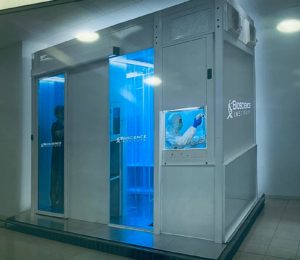
About Global Stem Cells Group
Global Stem Cells Group (GSCG) is a worldwide network that combines seven major medical corporations, each focused on furthering scientific and technological advancements to lead cutting-edge stem cell development, treatments, and training. The united efforts of GSCG’s affiliate companies provide medical practitioners with a one-stop hub for stem cell solutions that adhere to the highest medical standards.
- Published in Press Releases

